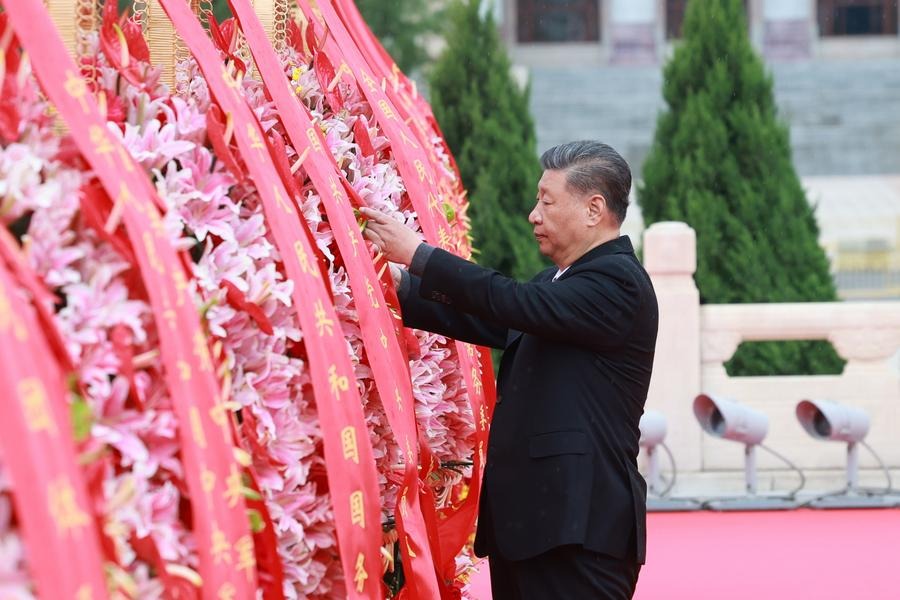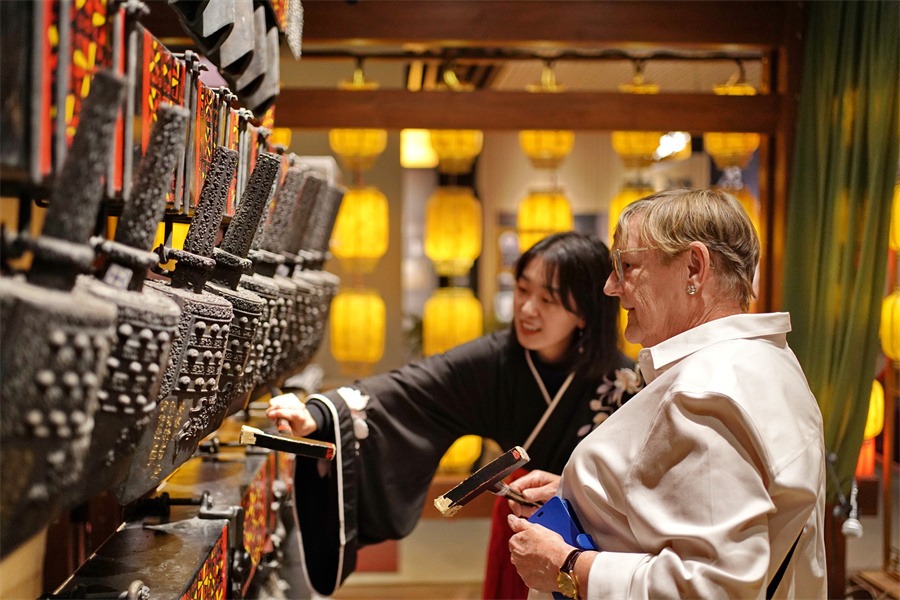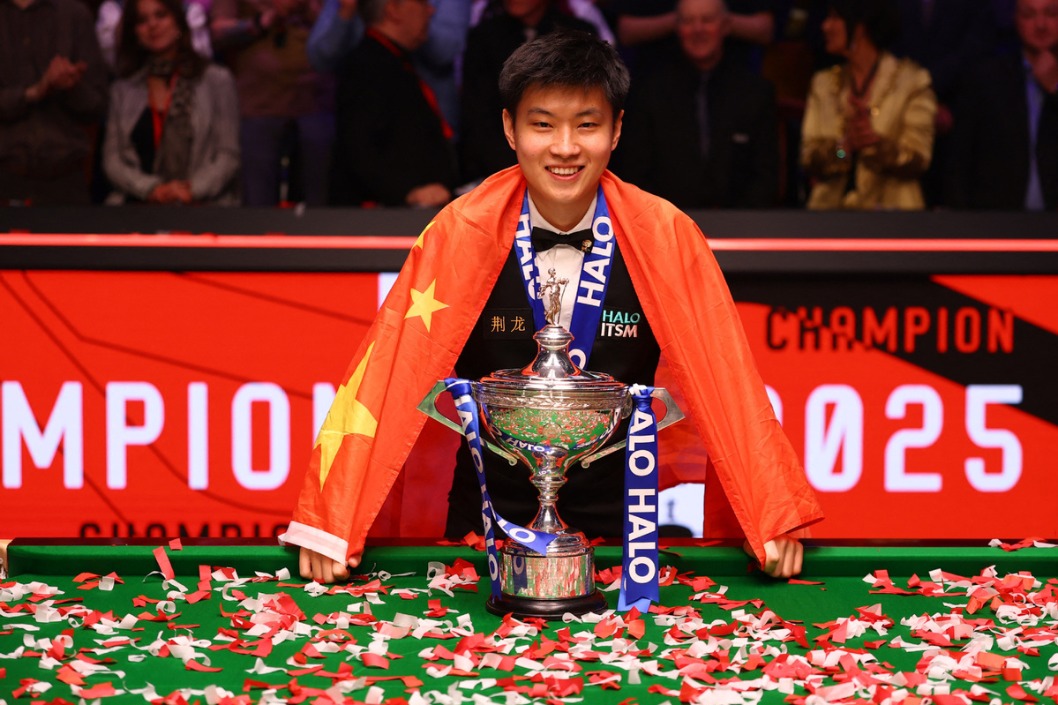Someone has to stand up and say 'NO'


More than 70 years ago, Chairman Mao Zedong remarked, "Weapons are an important factor in war, but not the decisive factor; it is people, not things, that are decisive".
This insight still resonates today as the United States intensifies its global tariff abuse, actions that have increasingly isolated it from the international community and undermined the multilateral trade system.
Some American politicians claim that China has "stolen" US jobs and hollowed out its manufacturing base, and argue that tariffs will bring manufacturing back to the US Such narrative is a distortion of a more complex truth: America's economic challenges do not come from outside, but are the result of policies that prioritized short-term profits over long-term industrial resilience.
While slogans like "Make America Great Again" appeal to national pride, US policymakers have, for decades, allowed capital to flow away from manufacturing into more lucrative financial and service sectors. This shift hollowed out industrial heartlands, fractured supply chains, and gave rise to the so-called "Rust Belt". Meanwhile, the booming financial market created the illusions of prosperity—masking the deep structural decline of the real economy.
China, on the other hand, did not limit itself to being the "world's factory". Rather, it pushed forward, aiming for higher-value industries through continuous innovation and industrial upgrading. This transformation—from "Made in China" to "Created in China"—has been driven not by protectionism, but by the diligence, creativity, and strategic foresight of the Chinese people.
Furthermore, the distribution of development gains also reveals stark contrasts. The United States has focused heavily on fueling the virtual economy, creating financial bubbles, and engaging in military expansion abroad. Domestically, its infrastructure deteriorates and social inequality deepens. China, on the other hand, has invested substantially in poverty alleviation, education, modern transportation, and smart urban development—creating tangible benefits for its citizens.
As one Chinese proverb warns, "To seek one's own temporary selfish interests at the expense of others is to seek the skin of a tiger". Appeasement does not bring peace; compromise is never respected when faced with aggression.
China understands this well. Faced with the escalating pressure of US tariffs, China has never backed down but stood firm and responded with countermeasures.
Seven years ago, the Chinese people said that if the US wanted to talk, the door was wide open. But if it insisted on a trade war, they would fight to the end with firm resolve.
Today, confronted with another round of tariff threats from Washington, China, once again, refuses to bow down or retreat. Instead, it has responded firmly and proportionately. The US, shaken by China's resolve, proposed a "90-day pause" for so-called negotiations.
Yet few regard these overtures as sincere. Negotiating simultaneously with 75 countries in just 90 days strains credibility. The real purpose is self-evident: to isolate China and reassert US dominance over global trade. As reported by The Wall Street Journal and Bloomberg, US officials have explicitly discussed how to pressure other nations to reduce trade with China or face secondary sanctions.
History also offers sobering lessons. The US crippled Japan's semiconductor industry and forced the appreciation of the yen through the 1985 Plaza Accord, pushing Japan into decades of stagnation. It repeatedly pledged not to expand NATO—only to break those promises later. As the political scientist John Mearsheimer noted, "The United States, as the most powerful liberal state, has pursued a strategy of liberal hegemony since the end of the Cold War... This policy is not just about spreading liberal values, but about maintaining American dominance by any means necessary, including coercion".
Silence in the face of aggression is not wisdom—it is complicity. When Nazi Germany invaded Czechoslovakia and Poland, the world's failure to say "no" paved the way for catastrophe. The same principle applies today.
If the world remains silent as the US continues to disregard WTO rules and flout the principles of multilateralism, the very foundation of global fairness will be jeopardized.
That is why China stood up and said NO. China's measured yet resolute countermeasures are bringing pressure and forcing a temporary re-calibration of American policy. As the British scholar Martin Jacques noted, China's stance not only protects its own interests but also defends the broader principles of global trade.
Nor should the world assume that economic reliance on the US is unchangeable. The US accounts for only 4 percent of the global population and less than 20 percent of world trade, and the portion is steadily shrinking. As one business owner in Yiwu, in China's eastern province of Zhejiang, told CNN, "If US companies don't buy my goods, I'll sell them to other clients".
While the US wields tariffs as a weapon, China continues to promote a universally beneficial and inclusive economic globalization to the benefit of all countries and communities. It gives all the Least Developed Countries (LDCs) having diplomatic relations with China zero-tariff treatment, has signed Belt and Road cooperation documents with over 150 countries and 30 international organizations, and continues to expand China-Europe freight rail services—the modern "steel camel" caravan that has facilitated cross-Eurasian trade by transporting more than 11 million containers worth over $420 billion. Notably, the 137th Canton Fair, held shortly after the new US tariffs came into effect, set a new record for participation.
The more the US relies on coercion, the more China's strategic patience and moral credibility stand out. As Prof. Kishore Mahbubani argued, China's reserved countermeasures in the trade war could outlast US tariff offensives, akin to holding an untouched arsenal while the opponent runs out of their ammunition.
Public opinion is also shifting. Even American citizens themselves are beginning to question the costs of tariffs. Online discussions about circumventing tariffs or buying directly from Chinese manufacturers are gaining traction. Some influencers are exposing the real cost of production behind luxury brands, encouraging consumers to seek better value at the source.
In today's world, someone must stand up and say: "No". That "No" must be firm, heard, and echoed.
































